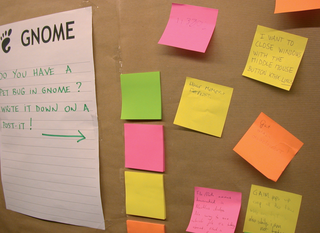
By Armijn Hemel
The FOSDEM conference has a unique position in the European FLOSS world. Geeks from across Europe - and further away - gather for a few days of talking, working on free software technologies, and having a good time (quite often fueled by the beer).
FOSDEM is different from most other conferences. You will not find "booths with suits," commercial talks, or business lounges. You will find a few buildings full of bright people, a great conference program, and a good opportunity to talk to others who are interested in free software. The conference is free; thus, your only expenses are for travel, lodging, and food. This formula clearly works because the number of visitors has increased steadily since the first FOSDEM (then OSDEM) in 2001.
Open source projects use FOSDEM as a place in which developers can meet face to face. There is no substitute for meeting in real life (IRL), which was proven by the large number of so-called developer rooms - smaller rooms (typically with 50 to 200 people) dedicated to a single subject or project. A few years ago, the conference had a handful of developer rooms, but this year there were 15, each with its own talks. Topics included Mozilla, openSUSE, and embedded computing.
There were more than 100 talks, and it was impossible to visit them all, but a few are in video format on the FOSDEM website. I sampled a few talks and discovered that the main theme this year was freedom. A surprising number of presentations touched on this subject, such as the talks about relicensing Sun's Java, Nouveau (open NVidia drivers), freeing PC BIOS with LinuxBIOS, and what is to come after GPL version 3.
A tradition at FOSDEM is to try to get the project leader, or at least an important developer, of a high-profile project to give a talk, so you can get the information straight from the horse's mouth. This year's conference included talks by Miguel de Icaza (Mono), Andrew Morton (Linux kernel), and Kern Sibbald, who came to talk about Bacula, an advanced open source backup tool. Kern made it clear that Bacula is a project all sys admins should keep an eye on.
Another very popular subject was the One Laptop Per Child project. An amazing amount of work has gone into this initiative, building on work from other free software projects, such as Fedora and Gnash.
A few sample laptops floating around the conference were spontaneously demoed out in the hallway, drawing a lot of attention.
That same hallway was also part of the conference track that might have been the most interesting of all: the hallway track. Lots of projects presented their software, sold merchandise, and hosted lively discussions.
The Debian project, for example, showed a PlayStation 3 running Linux, and several other projects experimented with embedded devices.
Georg Greve, the president of Free Software Foundation Europe (FSFE), summed up this edition of FOSDEM in a short, but very accurate, way: "FOSDEM is one of the central gathering points for the technical community that has assembled to build freedom. FSFE is glad to have been a part of this extraordinary meeting from the onset."
The FOSDEM organization should be very proud. Personally I think this was the best edition so far, and I am already looking forward to FOSDEM 2008.